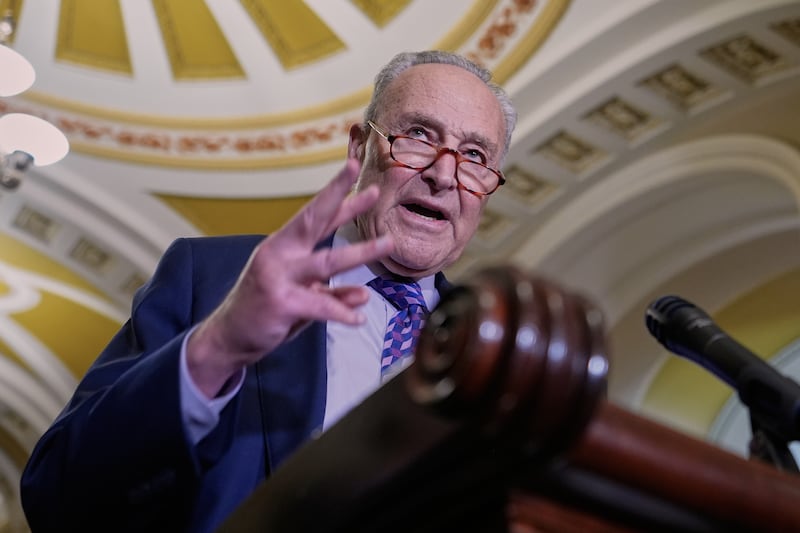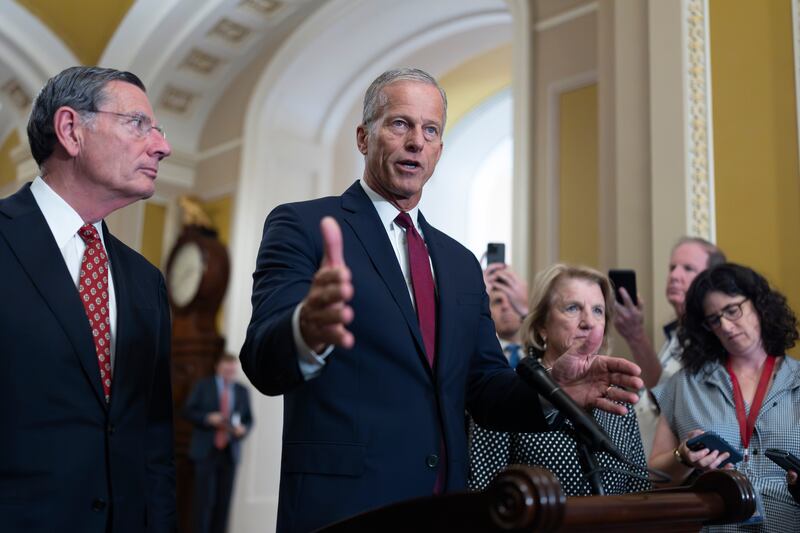WASHINGTON — Democratic leaders are finding themselves pushed into a corner when it comes to the upcoming government funding fight — and there doesn’t seem to be an obvious winning strategy for the party.
Government funding is set to lapse on Oct. 1 and lawmakers in both the House and Senate are far away from an agreement on where to set spending levels for the 2026 fiscal year. The process is historically bipartisan, but some Democrats are cautiously approaching the negotiating table with fears that President Donald Trump might upend any deals.
Senate Democrats have repeatedly warned they may not support legislation to avert a shutdown unless Republicans can guarantee they won’t vote later along party lines to strip the funding unilaterally. Republicans passed a rescissions package eliminating $9 billion in already-approved spending earlier this month, and Trump already has plans for more spending cuts.
But it puts Democrats in a tricky position: If they don’t help fund the government, they’ll be blamed for a shutdown.
Democrats consider path forward to avoid fault of government shutdown
Democratic leaders have been meeting with party members throughout the week to discuss a path forward on government funding after weeks of threatening to derail the process.
Senate Minority Leader Chuck Schumer, D-N.Y., told reporters they want to “pursue a bipartisan, bicameral appropriations process” but said Republicans were making that “extremely difficult to do.”

Schumer met with House Democratic leaders this week to strategize messaging around the appropriations process, noting they would cooperate with Republicans if they allow for bipartisan involvement.
“It’s my expectation that if Republicans try to jam a highly partisan spending bill down the throats of the American people, the House will reject it,” House Minority Leader Hakeem Jeffries, D-N.Y., said on Monday. “It’s Republicans who have shown no willingness to do that, and you have Trump administration officials … saying that we should walk away as Republicans from the appropriations process, which means they want to shut down the government.”
Jeffries’ comments refer to suggestions from director of the Office of Management and Budget Russ Vought last week that the appropriations process should be “less bipartisan” — despite Senate procedure essentially requiring lawmakers from both parties to work together in order to fund the government.
Republicans amp up pressure on Democrats to own shutdown rhetoric
Meanwhile, GOP leaders in the Senate are singing a different tune as they prepare to place the full blame of a potential shutdown on Democrats.
“We’re trying to give (Democrats) what they’ve been asking for, which is a bipartisan appropriations process,” Senate Majority Leader John Thune, R-S.D., said on Tuesday. “Frankly, I think a lot of us around here think that’s long overdue.”

Still, Republicans are already making plans for future spending cut packages that could threaten whatever lawmakers manage to pass in September.
The White House is reportedly preparing a second rescissions package to send Congress later this fall, with much of those cuts targeting the Education Department. It’s not yet clear how much money will be stripped, but it could anger Democrats enough to refuse appropriations negotiations if they can’t guarantee the money will be protected.
“We haven’t made a final decision on what will be in the second rescissions package, but we’re of course talking about it,” House Majority Leader Steve Scalise, R-La., told Politico this week. “The administration is very interested in it.”
Democrats play along — so far
The Senate began votes on its first round of appropriations bills this week, and a majority of Democrats have already supported those pieces of legislation.
“It was done in a bipartisan process, no question about it,” Schumer said after supporting a procedural vote to advance the spending bill for the Department of Veterans Affairs. “Second, it undoes many of the awful DOGE cuts to veterans. And third, we’ll have an amendment process after. This is just a motion to proceed.”
Other Democrats appeared to follow suit.
“I’m going to vote for it because I criticized them for abandoning the bipartisan process and this is a very, very small step in the right direction,” Sen. Brian Schatz, D-Hawaii, said.
It’s a delicate balance Democrats will need to maintain, and it’s unclear if they’ll accept the consequences of a shutdown if Republicans move forward with plans to unilaterally cut funding.


